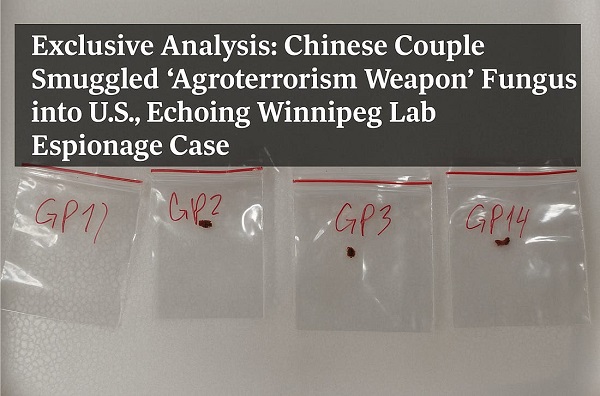Crime
USAID paperwork found in car of Boulder terror suspect

 MxM News
MxM News
Quick Hit:
Authorities say Mohamed Sabry Soliman, the suspect in Sunday’s alleged terror attack on pro-Israel demonstrators in Boulder, had documents labeled “USAID” in his vehicle. The Egyptian national is accused of planning the attack for a year and using Molotov cocktails to target what he called a “Zionist group.”
Key Details:
- Boulder police say eight people were injured in the June 1 attack on the pro-Israel “Run for Their Lives” protest.
- Paperwork marked “USAID” was found in Soliman’s car, but officials say he is not affiliated with the agency.
- Soliman overstayed a visa, was granted a work permit under the Biden administration, and now faces multiple terror-related charges.
Diving Deeper:
The man accused of carrying out a violent and ideologically motivated attack on a group of peaceful pro-Israel demonstrators in Boulder, Colorado, was found with paperwork marked “USAID” in his vehicle, according to an arrest affidavit. The suspect, Mohamed Sabry Soliman, is an Egyptian national who had overstayed a temporary visa and was in the U.S. illegally.
The incident unfolded on Sunday, June 1, when members of the “Run for Their Lives” group gathered on Pearl Street in Boulder to advocate for the release of hostages held by Hamas. Authorities say Soliman hurled incendiary devices at the group, injuring eight people. Initial emergency calls described someone “setting people on fire.”
Inside Soliman’s silver 2015 Toyota Prius, police reportedly discovered documents referencing “USAID,” as well as other paperwork mentioning “Israel” and “Palestine,” along with a red gas container and rags. A senior State Department official confirmed to Fox News Digital that Soliman has no employment ties to the U.S. Agency for International Development.
Soliman later told investigators he targeted the group because they were “Zionists,” and claimed he had been planning the attack for a year. “He specifically targeted the ‘Zionist Group’ that had gathered in Boulder,” the affidavit stated, noting he had researched the group online. Soliman also said he waited until after his daughter’s graduation to carry out the attack and expressed no remorse—telling officials he would do it again.
Authorities recovered a black plastic container nearby that held at least 14 unlit Molotov cocktails, reinforcing the premeditated nature of the act. Soliman was reportedly heard shouting “Free Palestine” as he was arrested.
He now faces a litany of serious charges, including multiple counts of attempted first-degree murder, crimes against the elderly, assault, and the use of explosives during a felony. His bond has been set at $10 million.
Federal records show Soliman entered the U.S. on a B1/B2 visa on August 27, 2022, which expired in February 2023. Instead of leaving, he applied for work authorization on March 29, 2023, and was approved through March 2025 under policies implemented by the Biden administration.
FBI Director Kash Patel labeled the incident a “targeted terror attack” and confirmed the agency is working closely with local authorities. “Our agents and local law enforcement are on the scene already, and we will share updates as more information becomes available,” Patel said in a statement.
The discovery of USAID-marked paperwork in the suspect’s car raises fresh questions about how federal documents end up in the hands of individuals accused of terrorism, especially amid mounting concerns over the Biden administration’s immigration and visa policies.
Crime
Exclusive Analysis: Chinese Couple Smuggled ‘Agroterrorism Weapon’ Fungus into U.S., Echoing Winnipeg Lab Ebola Espionage Case

 Sam Cooper
Sam Cooper
Potential Bioweapon Smuggling Across Borders: FBI Case Parallels Chinese Military Ties and Bio Espionage at Canada’s Top Lab
In a chilling insider threat case bearing striking similarities to China’s covert use of a married couple to develop an Ebola bioweapon and bat coronavirus research using Canada’s highest-security lab in Winnipeg, a Chinese researcher in Michigan and her boyfriend have been charged with smuggling a biological pathogen described as a potential “agroterrorism weapon” into the United States, according to federal charging documents unsealed Tuesday.
The FBI alleges that Yunqing Jian, a “loyal” Chinese Communist Party member and a 33-year-old postdoctoral researcher at the University of Michigan, and her boyfriend Zunyong Liu, 34, conspired to smuggle dangerous biological material, committed visa fraud, and made false statements to federal agents after U.S. border officials discovered samples of Fusarium graminearum hidden inside Liu’s backpack at Detroit Metropolitan Airport. The reddish plant material—identified as multiple strains of a fungus known to devastate cereal crops—was concealed in four plastic baggies, wrapped in tissues.
It was not the couple’s first illicit border crossing with biological materials. The case underscores a broader pattern: repeated clandestine transfers of biohazards across North American borders; visa fraud by Chinese students accessing elite laboratories; loyalty pledges to the Chinese Communist Party by researchers; and the strategic use of Chinese military-linked research grants—all elements shared with the notorious Winnipeg case.
At Canada’s National Microbiology Laboratory, researchers Dr. Xiangguo Qiu and her husband, Keding Cheng, secretly collaborated for years with China’s top biowarfare institutions—including the Wuhan Institute of Virology and the Academy of Military Medical Sciences. In 2019, Qiu and Cheng coordinated the unauthorized export of live Ebola and Henipah virus samples from Winnipeg to Wuhan. Canadian intelligence documents indicate that Keding Cheng pledged loyalty to the Chinese Communist Party, while Dr. Qiu was recruited as a key collaborator on the Wuhan lab’s bat filovirus project, which multiple Western intelligence agencies now assess resulted in an accidental lab leak that caused the COVID-19 pandemic.
The FBI’s newly unsealed agroterrorism case also details coordinated lab penetration involving facilities in Texas, Michigan, and Zhejiang University in China, dating back to at least 2022. In July 2024, Liu arrived in Detroit on a tourist visa while carrying several undeclared samples of the fungus, in violation of U.S. import restrictions, according to a sworn affidavit.
Since August 2022, Jian—evidently operating under Chinese Communist Party direction—had also worked at a university in Texas, where her research focused specifically on Fusarium graminearum. According to the FBI affidavit, her work at both the Texas institution and the University of Michigan was funded by the Chinese government. Files recovered from Jian’s phone included a signed “annual self-assessment form” dated January 2024 from Zhejiang University, in which she outlined her research accomplishments and affirmed her loyalty to the principles of the Chinese Communist Party.
“Electronic evidence also shows that Jian has been involved in smuggling packages of biological material into the United States on prior occasions,” the indictment alleges.
The allegation of Chinese funding and bonds of loyalty are critical to the case. Radio Free Asia has previously reported that many thousands of Chinese students studying abroad on government-backed scholarships are required to sign such forms as part of their continued funding.
The new U.S. indictment suggests a growing pattern of covert Chinese state-directed espionage activity targeting elite research facilities in North America, with espionage agents working under cover of academics and science—specifically involving romantic pairs who exploit Western institutions and scientific openness to traffic pathogens with dual-use potential.
U.S. Attorney Jerome Gorgan said in a statement: “The alleged actions of these Chinese nationals—including a loyal member of the Chinese Communist Party—are of the gravest national security concerns.”
“These two aliens have been charged with smuggling a fungus that has been described as a ‘potential agroterrorism weapon’ into the heartland of America, where they apparently intended to use a University of Michigan laboratory to further their scheme,” Gorgan added.
According to case filings, “Fusarium graminearum is responsible for billions of dollars in economic losses worldwide each year,” and “toxins produced by Fusarium graminearum cause vomiting, liver damage, and reproductive defects in livestock and humans.”
Agroterrorism is a form of hybrid warfare targeting a population’s food supply and economy. It involves the malicious use of plant or animal pathogens to cause devastating diseases and is closely related to biological and chemical warfare.
Liu and Jian had previously studied the pathogen as university students in China, according to the FBI. Since 2023, Jian had been working at the University of Michigan’s Molecular Plant-Microbe Interaction Laboratory, a facility focused on understanding the molecular biology of crop disease and plant immune responses.
Liu initially told U.S. Customs and Border Protection officers that he didn’t know what the materials were and suggested someone else must have planted them in his bag. But he quickly changed his story under FBI questioning.
“Liu stated that he intentionally hid the samples in his backpack because he knew there were restrictions on the importation of the materials,” the complaint says. “Liu confirmed that he had intentionally put the samples in a wad of tissues so CBP Officers would be less likely to find and confiscate them, and he could continue his research in the United States.”
Court filings show that Liu intended to deliver the samples to Jian’s lab and assist in cloning and culturing the fungus, should earlier experiments fail. Investigators say the couple coordinated in advance and had previously communicated about biological sample transfers.
When investigators spoke to Jian, she denied knowing anything about Liu’s smuggling or plans to research the pathogen.
But an examination of Liu’s and Jian’s electronic devices uncovered WeChat messages from 2022 in which they discussed smuggling seeds into the United States.
“I put them in my Martin boots,” Liu wrote, according to the complaint. “In a small bag. The ziplock bag. Very small.”
“That’s good,” Jian replied, the complaint says. “Just put it in your shoes.”
Liu’s attempt to bring fungal samples into the United States on a tourist visa, without the necessary permits, mirrors the unauthorized transfer of sensitive materials by Dr. Xiangguo Qiu and her husband Keding Cheng, who orchestrated the shipment of live Ebola and Henipah virus samples from Canada’s high-security lab to the Wuhan Institute of Virology in 2019. Documents from Canadian investigations indicated the couple and their students also smuggled biological materials from China into Canada for use in the Winnipeg lab.
Both incidents highlight a reckless disregard for biosecurity protocols and the coordinated use of Chinese students to infiltrate North American labs through visa fraud—bringing materials from China into research institutions and illegally conducting work on the samples using taxpayer-funded facilities to advance China’s scientific and strategic interests. As a Cold War-style scenario between Washington and Beijing heats up, and American military officials warn of China’s “imminent” threat to invade U.S. ally Taiwan, these actions also raise chilling questions about Beijing’s military-aligned objectives for this research.
In the case of the PLA penetration of Canada’s National Microbiology Laboratory in Winnipeg, investigations showed that in 2019, Qiu and Cheng coordinated the unauthorized shipment of live Ebola and Henipah virus samples from the Winnipeg lab to Wuhan, while conducting joint studies with an elite network of bioweapon researchers directly tied to PLA Major-General Chen Wei. CSIS investigations later confirmed Qiu was recruited into the Thousand Talents Plan.
As The Bureau has reported, in August 2018, CSIS warned senior federal health officials of insider threat risks related to Qiu and Cheng. Despite the warning, the couple maintained access to Canada’s most sensitive virology materials for months. Qiu’s collaboration with PLA military scientists on Ebola engineering and bat coronavirus projects was documented in co-authored papers and grant applications and award nominations.
As early as 2013, Keding Cheng filled out an application for the PRC’s “Science and Technology Innovation Talent Program,” requiring applicants to “passionately love the socialist motherland” and maintain Chinese citizenship.
By 2016, Dr. Qiu was nominated for an award by a senior military official from the Chinese Academy of Military Medical Sciences, recognizing her collaborations with Major-General Chen Wei, a leading figure in China’s biological weapons research. CSIS investigations revealed that Dr. Qiu and Major-General Chen collaborated on multiple research projects dating back to 2012.
Dr. Qiu’s use of Canada’s facilities to benefit China was well recognized in Beijing. An award nomination for Dr. Qiu noted that she “used Canada’s Level 4 Biosecurity Laboratory as a base to assist China to improve its capability to fight highly pathogenic pathogens … and achieved brilliant results.”
But in the Canadian case, for unknown reasons, the Chinese couple was allowed to return to China while under RCMP national security investigation.
The Michigan case charges come as the Trump administration is moving to tighten restrictions on Chinese access to U.S. research institutions. “We are looking to revoke visas for Chinese students, especially those with connections to the Chinese Communist Party or studying in critical fields,” Secretary of State Marco Rubio said last week. The Biden-era pause on such restrictions was formally reversed under President Trump’s new executive order in May.
The Bureau is a reader-supported publication.
To receive new posts and support my work, consider becoming a free or paid subscriber.
Invite your friends and earn rewards
Alberta
Pro-life activist describes how child traffickers take advantage of Alberta’s abortion lax laws

From LifeSiteNews
A recent article recounted how a 13-year-old girl was ‘sold’ to sex traffickers, found to be pregnant by her captors, and forced to take chemical abortion pills.
Richard Dur, a political consultant who serves as the executive director of Prolife Alberta, shared grisly details of how human traffickers are taking advantage of the province’s lax abortion laws to get away with essentially whatever they want when it comes to innocent life.
In a recent opinion piece for Juno News, Dur wrote about the shocking tale of a 13-year-old girl who was “sold” to sex traffickers. She was forced to come to western Canada from the Montreal area, found to be pregnant by her captors, and was then forced to take chemical abortion pills.
Dur noted that the girl’s traffickers knew that Alberta, notably the Red Deer area, was “good business,” as the “profits were higher.”
After the girl missed her period, the trafficker’s minder found out, as his job was to “watch the girls, track the bleeding, report anything that might interrupt business.”
The men had in place a “quiet solution” for such situations, that being abortion pills, which are widely available in Alberta without a prescription or doctor visits.
“No doctor’s visit. No age check — not that it would have mattered. Just two pills, mailed discreetly to the door of a short-term rental in southeast Calgary. One to stop the pregnancy. One to flush it out. Reproductive freedom — streamlined for traffickers,” Dur wrote.
After the girl was forced to take the pills, she bled all night by herself. She was forced back to “work” the next day.
Dur noted that this girl’s story is not “fiction” or “hypothetical” but is the “hidden reality behind Project Endgame — Alberta’s largest human trafficking bust.”
Police in the province have noted that traffickers have operated this way for over a decade, with victims being “coerced, transported, and exploited.”
However, what is left out of the picture by officials is that the reason the traffickers can get away with what they do is because of the province’s “permissive, on-demand abortion regime.”
In Alberta, Mifegymiso, which became available to Canadians in 2017, is now legal and free, allowing many women to kill their unborn babies at home without any medical supervision, often resulting in severe injuries to the mother in addition to the trauma of seeing their murdered baby. No ID, pregnancy test or medical exam is required.
Dur noted that another woman, “an older girl, or the trafficker’s assistant,” can obtain the drugs easily for anyone.
“No proof of pregnancy required. All it takes is a phone call and a mailing address. Or the trafficker standing over her, watching, listening. He never needs to leave the room. He never needs to lose control,” he wrote.
Canada’s “free” contraceptive law was passed last year and came about as a result of Bill C-64. The law was introduced by the former government of Justin Trudeau.
Drugs for at-home chemical abortions are typically done in the form of drugs like Mifegymiso. In January, Campaign Life Coalition reported that a 19-year-old Canadian girl died after taking Mifegymiso.
Free contraception is not ‘liberation’ but allows for ‘a license for exploitation,’ says Dur
Dur recounted that the story of the young women forced into the underground sex trade shows how the current system in Alberta and Canada has resulted in girls being enslaved at shocking rates.
“When a 13-year-old girl can be trafficked, abused, and silenced with a phone call and two pills, we must ask: who, exactly, is this system protecting? But she is not the exception,” he wrote.
“She is the victim of a system functioning exactly as it’s been designed to — with no guardrails. That’s not liberation. That’s a license for exploitation.”
Dur observed that for all the Alberta government says it does to combat trafficking, “there’s a glaring loophole in its strategy — one traffickers depend on.”
“Its name? On-demand abortion access,” he noted.
While the United Conservative Government (UCP) has promised to do more to combat traffickers, with Public Safety Minister Mike Ellis saying “Human trafficking is a serious and often hidden crime that devastates lives and communities,” the reality is that it is hidden due in part to abortion pills.
“A trafficker can control a young girl’s body, her movements, and even the consequences of his crimes — because Alberta allows it. If we are serious about protecting the exploited, we must be serious about what’s enabling their continued exploitation,” Dur wrote.
Dur noted that if traffickers can cross borders “without inspection, why wouldn’t they exploit abortion access that’s just as unguarded?”
According to Ellis “We’re not just trying to make headlines — we’re trying to change lives.”
Dur said that the “change” should start today with changing the policy regarding abortion pills taken at home.
“Change the policy that lets predators cover their crimes with a phone call and a mailing address. Close the loophole that puts abortion — chemical or surgical — in the hands of men exploiting vulnerable girls, with no age restriction, no parental notification, no questions, and no oversight,” he noted.
“Because right now, Alberta rescues victims with one hand — and hands them back to their abusers with the other.”
-

 Business2 days ago
Business2 days agoCarney’s Energy Mirage: Why the Prospects of Economic Recovery Remain Bleak
-

 National2 days ago
National2 days agoCensured doctor who’s now a Conservative MP calls COVID mandates ‘full Communism’
-

 Censorship Industrial Complex2 days ago
Censorship Industrial Complex2 days agoBC nurse faces $163k legal bill for co-sponsored a billboard reading, “I [heart] JK Rowling.”
-

 Daily Caller2 days ago
Daily Caller2 days agoLiberals Embrace Islamic Extremism In Canada
-

 Censorship Industrial Complex1 day ago
Censorship Industrial Complex1 day agoLegal warning sent to Ontario school board for suspending elected school council member
-

 Fraser Institute1 day ago
Fraser Institute1 day agoHealth-care lessons from Switzerland for a Canada ready for reform
-

 Business1 day ago
Business1 day agoThis Sunday, June 8, is Tax Freedom Day, when Canadians finally start working for themselves
-

 Bruce Dowbiggin1 day ago
Bruce Dowbiggin1 day agoI’m A Victim, You’re A Victim, Wouldn’t You Like To Be A Victim, Too?





